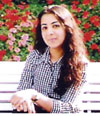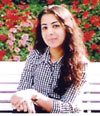
Book review: The Tainted Shadow”It is up to you what you make of your shadow [Archives:2006/918/Culture]
February 6 2006
 |
Not until you reach the end do you realize from where the title comes. “The Tainted Shadow” is a unique novel that could start a new trend in creative writing. Maleeha Kamal, the 22-year-old author, not only describes the life of Sara, a Yemeni Jewish girl, but the life, death and afterlife of the main character's relatives and friends. Sara becomes Arwa after she reverts to Islam. Her quest for truth, love and peace touches the reader and invariably makes one relate to her. The entire story's abstract approach downplays the melodrama that sometimes tends to dominate individual chapters.
This novel clearly has a message and although it could be taken as light reading, it carries some heavy thoughts to the attentive reader. “It is up to you what you make of your shadow the main character says at novel's end. As if directing its message to the reader, Arwa indicates that one's deeds in this life are one's choice, upon which destiny in the afterlife depends. The novel's descriptions of heaven and hell and punishment or reward are intriguing. Yet, although the reader has the freedom to agree or disagree with the author's judgments, one must admit that the writing compels the reader to stop and think.
The story is based in Yemen, particularly the southern part of Aden and neighboring towns perhaps centuries ago. There are some factual misconceptions which would be realized only by historians or well-versed Yemenis, yet the overall description is fairly accurate. Surprisingly enough, author Kamal has never been to Yemen, yet her vast imagination helped her fill in the history blanks – a good start for a promising writer.
Q: Could you tell us about yourself?
A: I am 22 years old, married with a 1-year-old girl. I shuttle between Jeddah, Saudi Arabia, and London, where I was raised.
Despite studying Environmental Policy and Economics at London School of Economics, I decided to busy myself with my passion – writing. Whenever I write, I feel myself trapped in an incubator and this enables me to constantly evolve as an individual. I must say, it was a well-deserved break from lectures!
I began writing long before university. This novel began there, but poetry and short stories have spewed out of this head for as long as I can remember. I feel that writing is a very relevant medium, especially given today's plastic age of electronics, to sustain the real lifeblood of creativity – human thought.
Q: Do you think you relate in any way to your novel's main character and her struggle in life?
A: All writers have a component of their own life experience integrated in their fiction. In the same way, I also am related directly to the protagonist, Sara. She wanders through life with a separate identity to that of the environment in which she grows up – being a Jew planted in a Muslim environment. This conflict deliberately was the novel's contextual basis so readers can see similarity between the two communities, rather than the expected hatred spotlighted by contemporary media. Every community, culture or religion has its positives and negatives. Likewise, Sara extracts the positives available to her and builds her inner self. Like every human being, her insoluble dichotomy is healed through her soul.
Similarly, I was from a Muslim background and born in a cosmopolitan city, London. My family was not that religious and I had school peers who had no religion. That was the first spark for me. I supposedly was 'Muslim,' others were Christian, Hindu, etc., and then there was this weird group with no religion. As I got older, previously claimed 'Christians' now called themselves 'atheists.' Hindus remained Hindus, but were nominal believers. My best friend was an Orthodox Jew.
So from then on, I embarked on a journey to color my spirit. I felt its presence in every action I took – this invisible body moving, thinking and feeling in parallel motion with me – and I felt it fair to decide to which group it should belong. I felt it necessary to belong to a faith group so I could feed it whenever it needed to be fed. I studied parts of the Torah, the gospel of Barnabas, the Bible and then the Qur'an. When I had questions about the Torah, I was met by crude stares saying, “Who is this nosy kid?” so I irrevocably shrank back into my hole of dissatisfaction. When I asked people who stated they were Christians about their faith, they had no clue. It was when I read the Qur'an that I realized that even kids younger than me knew what they were talking about! The Islamic community was better-read and better-informed than the Christian or Jewish groups. For every question, I got a solid answer. I felt proud to be a Muslim. I re-birthed myself into my roots. It was only many years later that I discovered the reason for this trend and disparities between awareness levels and I put that answer in the novel.
Q: Do you consider yourself a religious person? What was the message you wanted to convey through your work?
A: I am a Muslim and I try to keep myself on the straight path as much as I can. There are always better or worse routes on the way, but I try to maintain a balance.
In present times, where emotions can be expressed through much technology, it is every individual's duty to maintain a balance. From my writing, all I hope to give my readers is personal value. That value will be at its premium if they turn and take a look at their inner selves and go on an expedition to find their spirit's identity.
Q: What inspired you to write such a novel?
A: The backbone of my inspiration was my own life experience. Writers can't write anything of any substance without a significant life experience from which they themselves can grow and perhaps feed others too.
Q: Why Yemen? How difficult was it to get information about Jews' lives in Aden in the 18th century?
A: The social and historical context was chosen very specifically because unlike other Middle Eastern countries, Yemen comparatively has resisted the temptation and alluring spin of globalization. In doing this, Yemen has preserved its history and its people's social identity from Westernization. This is an excellent aspect because the whole world is being cloned into one culture. This type of polarization was ideal for the novel. Also, Yemen historically has been the coffee market's world leader – ahead, but still lagging enough to remain happy on its own. This economic advantage was ideal for my novel. For me, Yemen was a symbol that shouted, “Money can't buy happiness!”
Initially, it was quite difficult to find information about Jews in Yemen. But when I began to see what strong ties were evident between the communities, I couldn't resist. It was an excellent template for my story.
Q: Living in Saudi Arabia, are there any risks in writing such a story?
A: Hmmm ews and Muslims in the same book and the protagonist is a Jew and a Muslim too! It's very controversial and stimulates the reader's feelings and expectations straight away. As Sara develops in the story, the reader automatically does too. Saudi Arabia is very tolerant when it comes to volatile subjects. I myself was surprised to see a novel on homosexuality at the leading bookstore. So no, the Saudi nation takes on different opinions very well.
Q: I understand you are working on a second novel. Could you tell us about it?
A: My second novel is a bit on the low now, but it's about parents and children and how they relate to the physical environment. Oooh, I see a raised eyebrow. It sounds really cheesy at present but I assure you, the finished piece will be worth waiting for!
Q: What feedback do you expect to get from Yemeni readers, especially Yemeni Jews?
A: From Yemenis, just what I am receiving right now from my readers, regardless of their background – satisfaction that a young Muslim is expressing contemporary subjects in exotic settings. From extremist Muslims and Jews – identification with the other community through a spiritual magnifying glass.
Q: What would you advise young writers struggling to complete their first literary work?
A: Keep going, no matter what. Write whenever you get time, even in the most awkward places. I have a 1-year-old daughter and I find myself writing sometimes when we're in the car and my husband is driving! And remember, your writing only needs to matter to you. If it succeeds in doing that, it will succeed with others.
——
[archive-e:918-v:14-y:2006-d:2006-02-06-p:culture]


